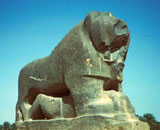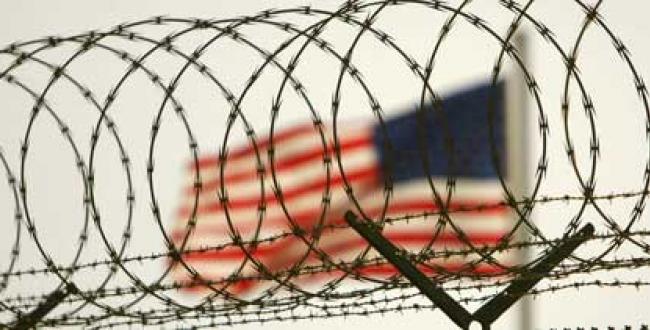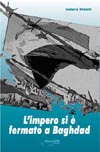September 3, 2010
 Although U.S. officials have attributed the torture of Muslim prisoners in American custody to a handful of maverick guards or limited to a few "high-value detainees," such criminal acts were widely perpetrated, likely involving large numbers of military personnel, a book by a survivor suggests.
Although U.S. officials have attributed the torture of Muslim prisoners in American custody to a handful of maverick guards or limited to a few "high-value detainees," such criminal acts were widely perpetrated, likely involving large numbers of military personnel, a book by a survivor suggests.
According to Murat Kurnaz, a Turkish citizen raised in Germany and defamed as "the German Taliban," torture at the several prisons in which he was held was frequent, commonplace, and committed by many guards.
In his book, Five Years of My Life: An Innocent Man in Guantanamo, he writes that his beatings began in 2001 on the flight from Pakistan (where he was pulled off a public bus and sold by Pakistani police for $3,000) to his first imprisonment in Afghanistan. Kurnaz wrote:
I couldn’t see how many soldiers there were, but to judge from the confusion of voices it must have been a lot. They went from one prisoner to the next, hitting us with their fists, their billy clubs, and the butts of their rifles.
This was done to men who were manacled to the floor of the plane, Kurnaz said, adding:
It was as cold as a refrigerator; I was sitting on bare metal and icy air was coming from a vent or a fan. I tried to go to sleep, but they kept hitting me and waking me. … They never tired of beating us, laughing all the while.
On another occasion, Kurnaz counted seven guards who were beating a prisoner with the butts of their rifles and kicking him with their boots until he died. At one point, Kurnaz was hung by chains with his arms behind his back for five days:
Today I know that a lot of inmates died from treatment like this.
When he was finally taken down and needed water, "they’d just pour the water over my head and laugh," Kurnaz wrote. The guards even tortured a blind man who was older than 90 "the same way the rest of us were," he wrote.
At Camp X-Ray, Guantanamo, Cuba, Kurnaz said:
During the day, we had to remain seated and at night we had to lie down. If you lay down during the day you were punished. … We weren’t allowed to talk. We weren’t to speak to or look at the guards. We weren’t allowed to draw in the sand or whistle or sing or smile. Every time I unknowingly broke a rule, or because they had just invented a new one … an IRF (Immediate Reaction Force) team would come and beat me.
Once when he was weak from a hunger strike, Kurnaz wrote, "I was beaten on a stretcher."
During his earlier imprisonment at Kandahar, Pakistan, Kurnaz writes:
There were weaker, older men in the pen. Men with broken feet, men whose legs and arms were fractured or had turned blue, red, or yellow from pus. There were prisoners with broken jaws, fingers and noses, and with terribly swollen faces like mine.
Not only were the wounds of such men ignored by guards but complicit doctors would examine him and other prisoners and advise guards as to how much more they could stand before they died. On one occasion, he saw guards beating a prisoner with no legs.
Still worse, Kurnaz said doctors participated in the tortures. A dentist asked to pull out a prisoner’s rotten tooth pulled out all his healthy ones as well, he wrote, adding that another prisoner who went to the doctor to treat one finger with severe frostbite had all his other fingers amputated.
I saw open wounds that weren’t treated. A lot of people had been beaten so often they had broken legs, arms and feet. The fractures, too, remained untreated. I never saw anyone in a cast.
Prisoners were deliberately weakened by starvation diets, he said. Meals at Guantanamo consisted of "three spoonfuls of rice, a slice of dry bread, and a plastic spoon. That was it," he wrote, adding that sometimes a loaf of bread was tossed over a fence into their compound.
Prisoners who should have been in hospital beds instead were confined to cells purposefully designed to increase their pain, Kurnaz wrote. He described his experience this way:
Those cells were like ovens. The sun beat down on the metal roof at noon and directly on the sides of the cage in the mornings and afternoons.
All told, I think I spent roughly a year alone in absolute darkness, either in a cooler or an oven, with little food, and once I spent three months straight in solitary confinement.
Prisoners could be put in solitary confinement for the tiniest infractions of the most ridiculous rules, such as not folding a blanket properly, Kurnaz said. "I was always being punished and humiliated, regardless of what I did," he wrote., noting that once, he was put in solitary for 10 days for feeding breadcrumbs to an iguana that had crawled into his cage.
Besides regular beatings from the Immediate Reaction Force, which commonly entered cells with clubs swinging, Kurnaz received excruciating electroshocks to his feet and was waterboarded in a 20-inch diameter plastic bucket filled with water, he said.
He described the experience as follows:
Someone grabbed me by the hair. The soldiers seized my arms and pushed my head underwater. … Drowning is a horrible way to die. They pulled my head back up [and asked], 'Do you like it? You want more?
When my head was back underwater, I felt a blow to my stomach…. 'Where is Osama?’ 'Who are you?’ I tried to speak but I couldn’t. I swallowed some water. … It became harder and harder to breath, the more they hit me in the stomach and pushed my head underwater. I felt my heart racing.
They didn’t let up. … I imagined myself screaming underwater. … I would have told them everything. But what was I supposed to tell them?
It should be noted that U.S. and German authorities had decided as early as 2002 that Kurnaz was innocent, that he really was a student of the Koran in Pakistan when he had been seized by bounty hunters and sold to the Americans as a "terrorist." Yet they continued his abuse for years.
On yet other occasions, Kurnaz, like so many other prisoners, was hung from chains backwards so that "it felt as though my shoulders were going to break," he said, adding:
I was hoisted up until my feet no longer touched the ground. … After a while, the cuffs seemed like they were cutting my wrists down to the bone.
My shoulders felt like someone was trying to pull my arms out of their sockets. … When they hung me up backwards, it felt as though my shoulders were going to break. … I was strung up for five days. … Three times a day soldiers came in and let me down (and) a doctor examined me and took my pulse. 'Okay,’ he said. The soldiers hoisted me back up.
I lost all feeling in my arms and hands. I still felt pain in other parts of my body, like in my chest around my heart.
A short distance away Kurnaz said he could see another man hanging from chains, dead.
When Kurnaz was transferred within the Guantanamo prison system to "Camp 1," he was put in a maximum security cage inside a giant container with metal walls, he wrote, adding:
Although the cage was no smaller than the one in Camp X-Ray, the bunk reduced the amount of free space to around three-and-a-half feet by three-and-a-half feet. At the far end of the cage, an aluminum toilet and a sink took up even more room. How was I going to stand this? …
I hardly saw the sun at all. They had perfected their prison. It felt like being sealed alive in a ship container.
Although some U.S. politicians and right-wing radio talk show hosts ridiculed the harm of sleep deprivation against prisoners, this techniques was an insidious practice used earlier in Bolshevik Russia to torture enemies, a method known as "the conveyor belt."
In 2002, Kurnaz wrote, when General Geoffrey Miller took over command of Guantanamo, "The interrogations got more brutal, more frequent, and longer."
Miller commenced "Operation Sandman," in which prisoners were moved to new cells every hour or two "to completely deprive us of sleep, and he achieved it," Kurnaz said. "I had to stand and kneel twenty-four hours a day," often in chains, and "I had barely arrived in a new cell and lay down on the bunk, before they came again to move me. …
"As soon as the guards saw me close my eyes … they’d kick at the door or punch me in the face." In between transfers, "I was interrogated … I estimated the sessions lasted up to fifteen hours" during which the interrogator might disappear for hours at a time.
I sat chained to my chair or kneeling on the floor, and as soon as my eyelids drooped, soldiers would wake me with a couple of blows. … Days and nights without sleep. Blows and new cages. Again, the stabbing sensation of thousands of needles throughout my entire body.
I would have loved to step outside my body, but I couldn’t. … I went three weeks without sleep. … The soldiers came at night and made us stand for hours on end at gunpoint. At this point, I weighed less than 130 pounds.
Finally, in August 2006, Kurnaz was released to Germany and testified by video-link in 2008 to the U.S. Congress. During his five years of confinement, he was never charged with a crime.
And so it happened that, during the presidency of George W. Bush, tens of thousands of innocent human beings, Kurnaz among them, were swept up in dragnet arrests by the invading American forces or their allies and imprisoned without legal recourse, the very opposite of what America’s Founders gifted to humanity in the Constitution.
Yet, pretty much the only people implicated in these human rights crimes to face any punishment were a handful of low-ranking guards at Iraq’s Abu Ghraib’s prison whose true crime — in the eyes of Official Washington — apparently was to allow photographs of their actions to reach the public.
After the photographs of sadism at Iraq’s Abu Ghraib prison in May 2004, shocked the world, President George W. Bush called the revelations "a stain on our country’s honor and our country’s reputation."
He told visiting King Abdullah of Jordan in the Oval Office that "I was sorry for the humiliation suffered by the Iraqi prisoners, and the humiliation suffered by their families." Bush told the Washington Post, "I told him (Abdullah) I was equally sorry that people who have been seeing those pictures didn’t understand the true nature and heart of America."
A year later, Private Lynddie England and 10 others from the 372nd Military Police Company were convicted of abusing Abu Ghraib prisoners. But the truth was that their actions followed in the footsteps of "war on terror" prison guards across the spectrum of Pentagon and CIA detention camps, often following direct orders from Bush’s White House.
Although President Bush made the Abu Ghraib revelations sound like an aberration that inflicted some un-American acts of "humiliation" on a small groups of detainees, the Abu Ghraib photos actually gave the world a glimpse into far greater crimes of every sordid type.
While a handful of guards like Ms. England — notorious for posing with naked Iraqi prisoners — were convicted and jailed, the many other hundreds or thousands of military guards, interrogators and doctors and dentists involved in widespread tortures have never been prosecuted for their crimes.
Sherwood Ross is an American writer who worked in the civil rights movement and for national magazines and wire services. Today, he runs a public relations firm for good causes. Reach him at sherwoodross10@gmail.com


















